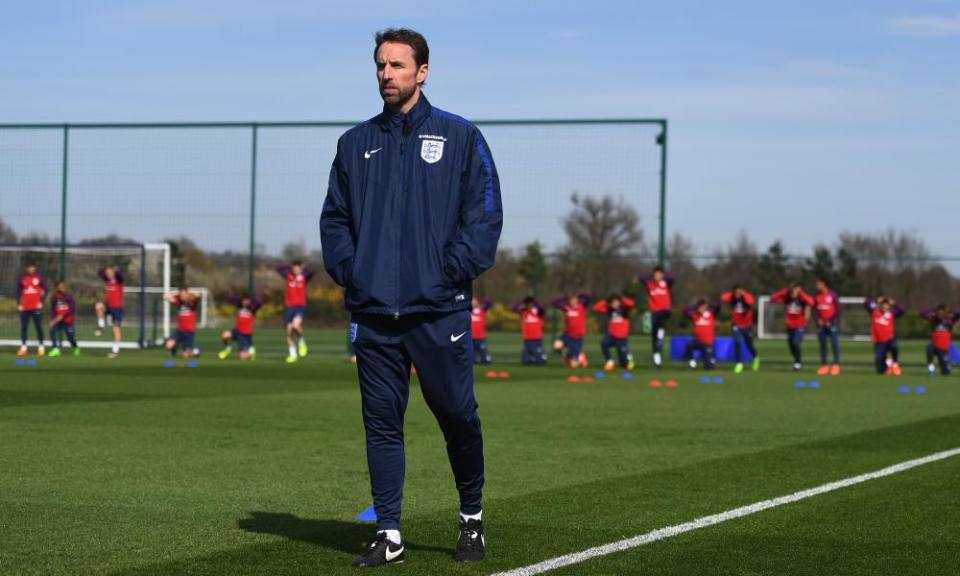Gareth Southgate lets England players and Eddie Jones do the talking | Dominic Fifield

Gareth Southgate handed the stage to the player at his side when it came down to dissecting more precisely the advice and guidance offered up by Eddie Jones on Friday night. The England rugby union coach had addressed the nation’s senior football squad back at their team hotel in Hertfordshire, his presentation devoid of PowerPoint slides or whiteboard bullet points. Players have a tendency to drift off on such occasions, staring blankly at the rat‑a‑tat of buzzwords, but the Australian apparently held the room.
“We have taken massive inspiration from his work,” said Ryan Bertrand. “His England team were on a fantastic record run [equalling New Zealand’s 18-game winning streak], so we dug deep to find out what measures he had put in to achieve that sustainable success. Not just temporary success, getting the odd win, but making it sustainable.
“It was a real eye-opener and the squad came out of the meeting with our ideas a lot clearer. We’re creating a new, open culture focused on being the best we can be. That comes down to working hard. How do you sustain it? You just have to work harder. We want to achieve things for the country as a group.
“Gareth has tried to give us a direction, plans and ambitions behind closed doors that we want to achieve,” continued Bertrand. “But in the end it’s the players who lead. It’s the players who need to be looking after one another, making sure the expectations are constantly met. You have to breathe that culture. It has to be 24-7. You can’t have off days. That was very much the impression we got [from Jones], that it was one of the main philosophies which enabled the rugby team to achieve what they have.”
The players had fired off questions after the Australian’s address, the dialogue as lively as it has been in Southgate’s own team meetings. This is a group, according to Bertrand, eager to take on greater responsibility.
The Southampton full-back’s words drew a nod of approval from his manager in the aftermath of the team’s last training session for Sunday’s World Cup qualifier against Lithuania. Southgate is one encouraging performance, albeit a defeat, into a four-year contract in charge of England, with the trust he has already built up within his playing staff clearer with each public appearance.
There had been shows of painful realism in the buildup to the 1-0 defeat against the world champions, Germany, on Wednesday. Recognition of years of underachievement and failings in knockout ties. Yet, encouraged by that fearless display in Dortmund, the manager could argue his willingness to hand a young squad greater responsibility in terms of preparation and approach is already reaping rewards.
There had been meetings up at St George’s Park before the midweek switch to 3-4‑3 – “They thought it was rubbish,” said Southgate, joking – where ideas were canvassed, opinions could be heard and approval achieved, and that same eagerness to listen has been carried on to the training pitches. This is not exactly a manager ceding power to his players. Indeed, the fact he recalled Terry Venables adopting a similarly open approach around Euro 96 suggested this is hardly a new concept. But Venables’s team had been crammed with strong personalities. The sense is the current squad, young and promising, is already developing its own leaders and Southgate’s desire to listen, coaxing newcomers from their shells, feels refreshing. Even his players referring to him publicly and privately as “Gareth”, rather than “the gaffer” or “the boss”, seems to signal a slight change in emphasis.
“You have to know the players’ feelings,” said Southgate. “They have a good view of the game and great experience as international players, and know if they have the options on the ball they feel they need. And they have to be comfortable in the roles you’re asking them to take on. It’s better to know any disagreement in the meeting before you get to the training pitch. You want everyone clear in his mind so they can go and express themselves. I don’t think it’s about power. But you have to be comfortable enough as a coach to be challenged.
“We prepare a team, but the most difficult thing to do is to cross that white line and play. You have to make decisions out on the field. For example, we might talk through set plays in advance but the opposition could do something different at any second, so the team have to be able to adapt in an instant. Unless you’re given that responsibility as a player, you won’t necessarily feel accountable or that your coach believes you can take on that responsibility.
“My belief is that these players are more than capable of making those decisions and playing against the very best teams in the world and being successful. Sometimes they need to see that evidence with their own eyes.”
Lithuania, ranked 107th in the world and fourth in Group F, will provide a different kind of test to the one offered by Germany. Depleted defensively, they will aim to stifle and clog up England’s more enterprising attacking play and the hosts may have to stay patient before the breakthrough is achieved.
Harry Kane had watched training in Enfield on Saturday and, while Southgate must wish he could call upon the Tottenham Hotspur striker, this is surely a game for the predatory Jermain Defoe, whose last cap was back in November 2013, and the trickery of Raheem Sterling on the flank. Regardless, an attack‑minded selection captained by Joe Hart must accept their newfound responsibility to keep England clear at the top of the group.

 Yahoo Sport
Yahoo Sport 





































